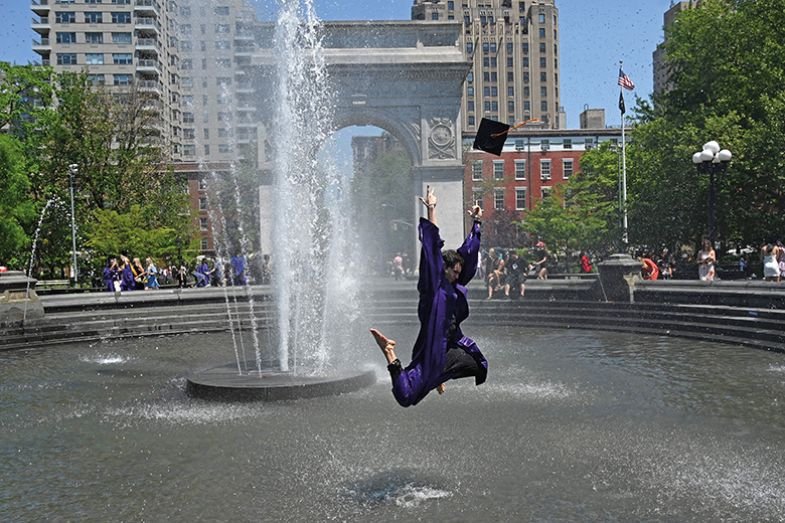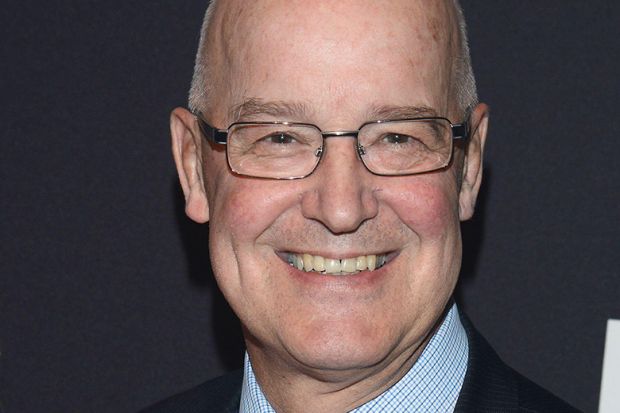World University Rankings 2023: results announced
Browse the full results of the World University Rankings 2023
Download a copy of the World University Rankings 2023 report
“Complex forces are at play,” says Andrew Hamilton. The rather ominous phrase is surprising coming from the otherwise energetic and upbeat president of New York University.
Political polarisation and waning public support for higher education are two of the forces troubling him. “Different sides of the political spectrum view higher education in very different ways,” he says. “Public perception of higher education is declining, the view of higher education as being essential for life, the public’s view of the role that higher education is playing in wider society, is, I regret to say, declining.”
This is a US problem, but is also seeping into other countries, including the UK, says the Brit who has made New York his home. And those nations that do not face this particular battle have others: “Each of us are seeing a set of challenges to our principal purpose.”
Hamilton spoke to Times Higher Education ahead of the World Academic Summit, THE’s largest annual event, hosted in 2022 by his own New York University. He discusses his worries but also his reasons for hope, and looks back on his achievements as president of NYU before he steps down next year.
One of the issues Hamilton anticipates being thrashed out in the debates and fringe events at the summit is how to bolster the public perception of universities. “We need to think about ways of getting across the message of why university matters,” he says. “And it does! It’s never mattered more than it does today, it’s never been more important to get a college degree for a productive and prosperous life than it is today.”
“I often think that’s one of the reasons we get so much attention focused on higher education is because we’ve never actually been more important,” he adds.
Hamilton began his tenure at NYU on 1 January 2016, following six years as vice-chancellor of the University of Oxford. He has spent much of his life hopping between the UK and North America: he was born in Surrey in the UK, studied at the University of Exeter and then the University of British Columbia, and completed his PhD at the University of Cambridge. He’s a chemist with a focus on the intersection of organic and biologic chemistry and worked at Yale for many years before taking the helm at Oxford in 2009.
He ruffled some feathers at Oxford when he advocated raising tuition fees in a period in which they were one of the biggest political hot potatoes in the UK. It was a surprise to some then when he doggedly took on the issue of affordability at NYU.
Hamilton says that when he began his tenure, NYU topped the ranking for price tag. So he staved off price increases each year and the institution is now about the 50th most expensive in the US. He also increased financial aid to more than half a billion dollars, and he boasts of having a higher percentage of Pell Grant students than Harvard, Princeton, Yale and Penn combined (at 24 per cent).
Reducing fees and spending more on aid means less cash to spend on research and teaching, so was Hamilton worried it would have a detrimental impact? “Oh, we are constantly worried about everything. The life of a university president is the worrier-in-chief,” he says. It doesn’t appear to have harmed NYU in the rankings anyhow (currently ranked 24th in the world, it was in 30th position in 2016).
The university achieved this, Hamilton says, by being targeted; “Identify[ing] and invest[ing] in academic areas that can be effective, that can advance the mission of the institution.”

Global links
NYU is known for making a success of foreign campuses, with substantial offshoots in Abu Dhabi and Shanghai, established under Hamilton’s predecessor John Sexton. The heyday of setting up fully fledged campuses abroad is probably behind us, and some may see rising geopolitical tensions as reason to limit them, especially in certain areas of the world, but Hamilton sticks by the strategy.
Russia’s invasion of Ukraine and increasing tensions between the US and China “reinforce why we shouldn’t be withdrawing, we shouldn’t be isolating ourselves”, he says.
He insists now is the time to do more to understand each other’s cultures, histories and backgrounds. When people challenge NYU’s China campus, he says he responds by asking, “Surely you’re not suggesting we should have fewer people in the United States who can speak Mandarin? Who are familiar with Chinese culture and Chinese history?”
Students return from their international campuses “transformed”, he says. “They come back often speaking the language, very familiar with the culture and the historical forces that are at play. And then they too can play their role in the national debates and discussions that naturally take place over time.”

NYC
On home turf, universities in areas with high costs of living sometimes struggle to hire faculty and recruit students. Perhaps the lure of living in one of the world’s most glamorous cities balances out the price tag, as Hamilton says they do not face this concern.
“New York City is a dynamic city, the links to business, the opportunities for internships, the opportunities for collaborations among our faculty, the cultural side of the city, that’s all acted as quite a strong magnet to recruit students and to recruit faculty.”

Trajectory
The theme of the World Academic Summit is “trajectories”, which for Hamilton applies to the trajectories of institutions and regions as well as the intellectual and socio-economic trajectory of young people. “The role of a university – yes, it’s to help the students get their first job. It’s also to help them get their fifth job, 20 years later.”
In a rapidly changing world, universities will need to fight hard to keep those trajectories going in a positive direction, but Hamilton is confident they will, with their secret weapon: reinvention.
“People always accuse universities of being static,” he says. “We are not, we are incredibly dynamic.”
“I always like to remind people that Oxford was already 300 years old when the previous information revolution occurred – it was called the printing press. Universities did pretty well in embracing the book.”
As then, universities are embracing the new circumstances brought about by the pandemic – such as online learning – and adjusting what they do.
Democracy and decentralised decision-making is another trick up the sleeve of universities, he says. Having run Oxford, probably the most famous decentralised university in the world – “pathologically” decentralised, Hamilton says with a laugh – he should know.
Oxford is nearly 900 years old, he points out, and NYU nearly 200. This decentralisation is “part of the secret to the longevity of universities”.
“One of the great strengths of universities, I believe, is that devolution, that sense of individual schools, even individual departments, faculty and student groups, having significant responsibility.”
During their time universities have seen a lot: “A lot of economic crises, a lot of Donald Trumps and Boris Johnsons, even quite a good number of pandemics have been and gone in the life of a university like Oxford or NYU or Yale.”
In summer 2023 Hamilton will step down as leader. What is his advice to other university leaders? “Hang in there. They are tough jobs these days.
“But they are also sublime and a privilege,” he adds.
This is part of our “Talking leadership” series of 50 interviews over 50 weeks with the people running the world’s top universities about how they solve common strategic issues and implement change. Follow the series here.
POSTSCRIPT:
Print headline: Mission: possible
Register to continue
Why register?
- Registration is free and only takes a moment
- Once registered, you can read 3 articles a month
- Sign up for our newsletter
Subscribe
Or subscribe for unlimited access to:
- Unlimited access to news, views, insights & reviews
- Digital editions
- Digital access to THE’s university and college rankings analysis
Already registered or a current subscriber? Login







